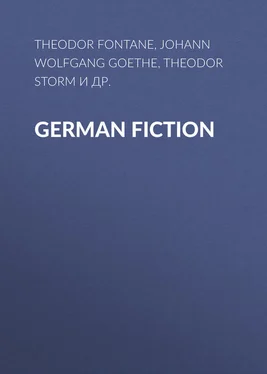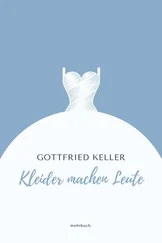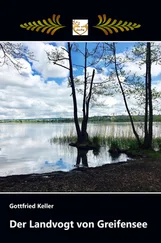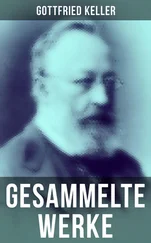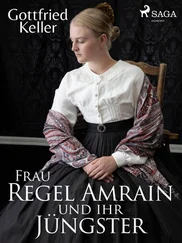Gottfried Keller - German Fiction
Здесь есть возможность читать онлайн «Gottfried Keller - German Fiction» — ознакомительный отрывок электронной книги совершенно бесплатно, а после прочтения отрывка купить полную версию. В некоторых случаях можно слушать аудио, скачать через торрент в формате fb2 и присутствует краткое содержание. Жанр: foreign_antique, foreign_prose, на английском языке. Описание произведения, (предисловие) а так же отзывы посетителей доступны на портале библиотеки ЛибКат.
- Название:German Fiction
- Автор:
- Жанр:
- Год:неизвестен
- ISBN:нет данных
- Рейтинг книги:3 / 5. Голосов: 1
-
Избранное:Добавить в избранное
- Отзывы:
-
Ваша оценка:
- 60
- 1
- 2
- 3
- 4
- 5
German Fiction: краткое содержание, описание и аннотация
Предлагаем к чтению аннотацию, описание, краткое содержание или предисловие (зависит от того, что написал сам автор книги «German Fiction»). Если вы не нашли необходимую информацию о книге — напишите в комментариях, мы постараемся отыскать её.
German Fiction — читать онлайн ознакомительный отрывок
Ниже представлен текст книги, разбитый по страницам. Система сохранения места последней прочитанной страницы, позволяет с удобством читать онлайн бесплатно книгу «German Fiction», без необходимости каждый раз заново искать на чём Вы остановились. Поставьте закладку, и сможете в любой момент перейти на страницу, на которой закончили чтение.
Интервал:
Закладка:
Theodor Fontane
German Fiction
THE NOVEL IN GERMANY
The fact that newspaper reporters commonly call their articles "stories" points to a certain analogy between the novel and the newspaper. Even when prose fiction aims to be a fine art, it readily takes on a journalistic character; it is usually designed for immediate effect-at the concomitant risk of producing no other-and it easily passes from hand to hand or from country to country. In our day prose fiction is almost an international phenomenon: novels of a high degree of popularity are immediately translated and promptly imitated in the most distant quarters of the globe.
In the universal give and take of literary commodities Germany has played her part and, from time to time at least, has been in no wise a debtor nation; but she has more often followed than led along new paths, making up in thoroughness what she lacked in originality, and a superficial history of the German novel would be little more than a record of how successive foreign influences were turned to account in domestic production. Thus, in the eighteenth century such sorrows as those of Werther would doubtless have found some form of expression, but Goethe could not have expressed them as he did without the example of Rousseau and Richardson. Wieland and Jean Paul Richter are inconceivable without Fielding and Sterne. In the nineteenth century the epochs of German novel-writing are marked by the times when Scott, Dickens, Balzac, Dumas, Sue, George Sand, Tolstoy, Ibsen, Björnson, Turgenev, Zola, or some other foreigner, happened for the moment to be most conspicuous on the literary horizon. During the century that lies between Goethe and Hauptmann there is hardly a German novelist who has invited imitation abroad. It is in the lyric poem that the Germans have excelled, and in the drama and the opera that they have scored their international successes.
The history of the German novel would have, however, also to record that those writers have secured the most permanent distinction who have most significantly modified in their own way the suggestions which foreign examples gave them, and that the greatest distinction of all belongs to writers whom we can, if we will, associate with one or another of the main currents, but who are by no means carried away by it. In the work of these men the national character of the German novel, if it has a national character, ought to be discoverable.
For two reasons it is a fair question whether the German novel has a national character. In the first place, modern Germany has been a nation only since 1871; and in the second place, only in times of some great crisis does there appear to be in Germany a national life, as we understand the term. At other times life in Germany is urban, provincial, or private, in those aspects of existence which the Germans most prize. The imperial capital affects to represent Germany as London represents England and Paris represents France; but such ascendancy is stoutly denied Berlin in the capitals of the other states, and Saxons or Bavarians refuse to submit to Prussian hegemony in any other than political and military affairs. In literature Prussia is not the nation; the empire itself is a federation of states, and Berlin is less specifically a German city than any other in the realm. Germany is emphatically e pluribus . Still, there may be some bond of union stronger than political alliance, some fundamental quality common to Prussian, Saxon, and Bavarian. In this we should seek the national character. We should find the national character depicted in the historical novel, which has had a great vogue in Germany; but we may discern it also in the fiction devoted to the problems of contemporary life.
It was Goethe's opinion that the hero of a novel should be passive, and so eminently dramatic a genius as Hebbel declared that the important thing for us to observe in any individual is not how he makes his mark in the world, but how the world makes its marks upon him. These views, synonymous in meaning, but uttered by men as different, one from the other, as two Germans could very well be, may suffice as an indication of the common quality for which we are seeking: it is the metaphysical cast of the German mind. When Goethe contemplated the transitoriness of conditions, and in all his work endeavored to catch and preserve these fleeting phenomena, or when Hebbel defined man as the resultant of conflicting forces rather than as an effective force in himself, both evidently thought of life as a product, not as a producer, and sought the meaning of life in personal reaction rather than in personal action. The life of which the German desires abundance is the inner life. Character is to him a greater good than conduct.
Accordingly, German literature is not rich in tales of adventurous activity-indeed, it affords few examples of pure narrative, that is, of stories told chiefly for the sake of chronicling events. When such a master narrator as Heinrich von Kleist tells a tale, he presents the facts objectively-no judicial referee could be more circumstantial; but in the case on which he reports the author sees the impersonation of a problem, and the data which really concern him are the perturbed emotions of a man or woman. The same is true of Kleist's contemporary, Ludwig Tieck, of the amiable Theodor Storm, and of the prolific Paul Heyse. The character, in its peculiar makeup and its peculiar circumstances, presents a problem, and the most significant evidence that its experiences furnish is its reaction upon the outside world. An author who treats this character will, then, dwell fondly upon psychological analysis and upon the atmosphere in which the character lives and moves and has its being.
These facts account for certain peculiarities of form in German fiction which to us seem like defects. It generally takes a German novelist a long while to get under way, and he generally appears to move in spirals. He invites us to tarry and survey the scenery-to which his hero is wont to be more sensitive than we are-and he tends to elaborate episodes, which serve indeed to bring out qualities in his persons, but which, an impatient reader would say, delay the action. Evidently, it is not the action about which the author primarily cares. But the German novelist has the merits of his defects: if he does not touch lightly, he does probe deeply, and if his characters cannot manage to get things done and over, their impediment is an excess of those personal endowments which have after all to be reckoned among the positive values of life. It is better to be sentimental or even whimsical than to have neither sentiments nor ideas.
Sentimentality and whimsicality are apt to strike one as the most prominent traits of any art that aims at what is characteristic and individual, rather than at what is typical and broadly representative. The Germans are individualists. They can cooperate efficiently with their fellow Germans, but each insists upon being himself. The German novelist will surely treat by preference a character of notable peculiarity, and if he writes many novels, he will try to give a conspectus of the qualities of the stock to which he belongs. Thus Reuter presents many characteristic figures taken from Mecklenburg; Ludwig from Thuringia; Auerbach from the Black Forest; Gotthelf, Keller, and Zahn from Switzerland; Fontane from Brandenburg; Storm and Frenssen from Schleswig-Holstein. So strong is this tendency that the Germans have a special name for this kind of art; they call it Heimatkunst , a word which may be translated "art of the native heath." If the author is a humorist, like Reuter or Keller, he will successfully recommend his whimsical creations to our indulgent esteem; or if he is a discriminating lover of mankind, like Ludwig, he will reconcile us even to the supersensitiveness of a narrow-minded but noble-hearted slater. The danger incurred by writers without humor and without discrimination is that their creations shall seem boorish or lachrymose.
Читать дальшеИнтервал:
Закладка:
Похожие книги на «German Fiction»
Представляем Вашему вниманию похожие книги на «German Fiction» списком для выбора. Мы отобрали схожую по названию и смыслу литературу в надежде предоставить читателям больше вариантов отыскать новые, интересные, ещё непрочитанные произведения.
Обсуждение, отзывы о книге «German Fiction» и просто собственные мнения читателей. Оставьте ваши комментарии, напишите, что Вы думаете о произведении, его смысле или главных героях. Укажите что конкретно понравилось, а что нет, и почему Вы так считаете.
